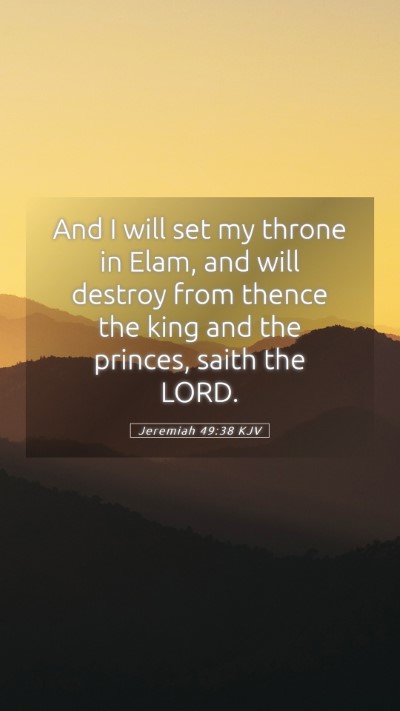Understanding Jeremiah 49:38
Jeremiah 49:38 states:
"And I will set my throne in Elam, and will destroy from thence the king and the princes, saith the Lord." (KJV)
Overview
This verse presents a pivotal prophecy concerning Elam, a nation historically located in what is now southwestern Iran. It indicates God's sovereignty and judgment over this region, emphasizing the themes of divine authority and predetermined plans regarding nations and leaders.
Bible Verse Commentary
The interpretations of Jeremiah 49:38 from various public domain commentaries provide insight into its theological implications, historical context, and prophetic significance:
- Matthew Henry:
Matthew Henry emphasizes that God's throne signifies His sovereignty over Elam. In this context, it implies that despite the kingship or governance of earthly powers, God ultimately directs the course of nations. The act of setting His throne suggests a shift in authority, indicating that Elam’s current rulers will be overthrown as part of divine judgment.
- Albert Barnes:
Albert Barnes points out that this prophecy serves as a warning to Elam, showcasing God's intention to execute His judgment. By referencing the complete destruction of the king and princes, Barnes reinforces that this prophecy was not just about political upheaval but a broader spiritual message about disobedience and the consequences of turning away from God.
- Adam Clarke:
Adam Clarke discusses the historical implications of this passage, relating it to the eventual downfall of Elam. He notes that such prophecies were common in the Old Testament, serving as reminders of God's control over history. Clarke further highlights that the mention of a throne symbolizes God's desire to rule and reign over all nations, including those that have strayed from His path.
Significance and Application
The significance of Jeremiah 49:38 can be viewed through both historical and contemporary lenses. Historically, it illustrates God's judgment upon nations that defy His will. In a modern context, believers may find relevance in recognizing that God's sovereignty extends over their lives and circumstances. Below are insights into how this verse can be applied today:
- Recognition of Divine Authority: Understanding Scripture often leads believers to realize that God remains in control of all earthly matters, encouraging trust in His ultimate plan.
- Reflection on Leadership: The destruction of king and princes can provoke contemplation among leaders and citizens regarding their actions and alignment with divine principles.
- Embracing Prophetic Warnings: Just as Elam faced consequences for its disobedience, individuals and nations today are called to heed biblical warnings and align their values with scriptural teachings.
- Engagement in Prayer: The acknowledgment of God's reigning throne inspires believers to pray for their leaders and nations, seeking a return to righteousness.
Cross References
Jeremiah 49:38 is related to several important passages that illuminate its meaning:
- Isaiah 21:2: A prophecy against the wilderness of the sea and the fall of Babylon.
- Jeremiah 25:17: A call for nations to drink the cup of divine wrath—similar themes of judgment are present.
- Ezekiel 32:24-25: References to the fall and judgment of Egypt enhance the understanding of God's wrath on nations.
Conclusion
In summary, Jeremiah 49:38 serves as a profound reminder of God's sovereignty and impending judgment against nations that disregard His will. Through a careful Bible verse analysis, believers can derive important lessons and apply them to modern life. Engaging in Bible study groups or utilizing Bible study resources may further enhance the understanding of such scriptures, enabling a deeper relationship with the divine.
As you seek to understand this and other Bible passages, remember that the meanings of Bible verses often resonate beyond their historical context, providing spiritual guidance and insight for everyday living.


